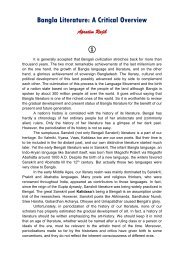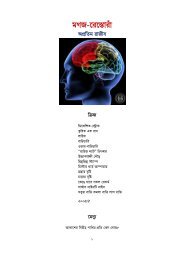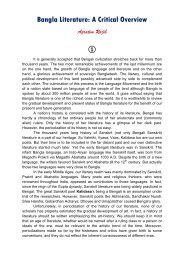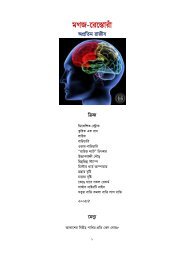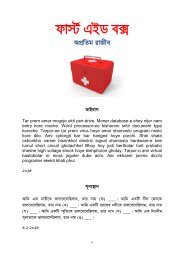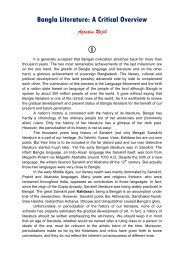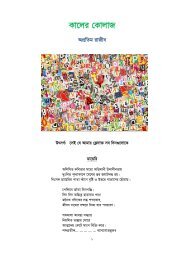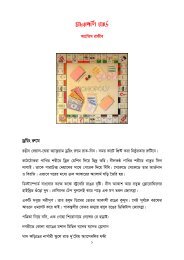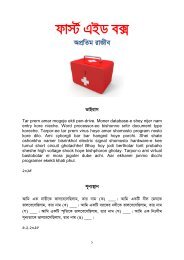Literature-Critique
Create successful ePaper yourself
Turn your PDF publications into a flip-book with our unique Google optimized e-Paper software.
29<br />
love with each other. A Pathan princess later does have a crush on him. And finally<br />
the prince marries the first one because of their religious commonness.<br />
His Chandrashekhar, despite having a historical background, is exuberant in<br />
psychological revelation of socially deprived lovers. Lovers denying social barrier<br />
suffer from guilt-complex and Shaivalini’s vision of hell is the result of her remorse for<br />
committing such a ‘sin’. In this novel, Bankim depicts sexual perverts along with true<br />
lovers. And at the end of the novel, he glorifies sacrifice for religiosity and piety on<br />
the question of love and sexuality.<br />
Rajani, another fictional work by him, is a dramatic presentation (comprised of<br />
monologues) of different characters who are inflicted with psychological dilemma.<br />
The characters uphold their own speech and thus the exposition of the writer’s own<br />
mind seems objective.<br />
And Krishnakanter Will (The Will of Krishnakanta) is a social novel having<br />
deep psychological revelation. A babu (i.e. Bengali Hindu gentleman), who loved his<br />
wife sincerely, leaves her for a widow who has extraordinary physical beauty. Later<br />
that woman betrays with him and he kills her mercilessly. His first wife also dies, and<br />
he becomes a bohemian hermit forsaking social life. Bankim, in this outstanding<br />
novel, depicts man’s sexual hunger, thirst for beauty and false lovers’ immorality. He<br />
champions pure and loyal love, a love based on religiosity, a love beyond mere<br />
physical attraction and false moments’ momentary impulse.<br />
His Kamalakanter Daptar (Kamalakanta’s Office) is a memorable satire,<br />
perhaps the best in this genre. The behavioral incongruities of a Bengali gentleman<br />
are drawn and ridiculed in this writing; his words are mostly philosophical and<br />
sometimes poetic. Lokrahashya (Mysteries of Men) and Muchiram Goorer<br />
Jibancharit (A Life-sketch of Muchiram Goor) are his other satires.<br />
Philosophically Bankim was a Positivist – a follower of August Comte. He took<br />
Comte’s religion of human welfare and finally reshaped it into the service of<br />
motherland.<br />
Bankim was also a ruthless moralist. His humanism is overshadowed by his<br />
religious thoughts. And he always vilified the idea of ‘love’ that is to him, a mere thirst<br />
for beauty.<br />
Nevertheless, through his works of huge range and complexities, Bankim<br />
shows us his gigantic might in visualizing the dark deep ocean of human mind. His<br />
discovery of human psyche largely reminds us of the great Shakespeare. Such<br />
attempt makes Bankim a visionary and prophet; he truly passed this tough trial.<br />
Biharilal Chakraborty (1835-’94)<br />
Biharilal is recognized in literary history as Tagore’s inspirer. Tagore admitted<br />
his debt to him, and called him his guru and also the ‘Morning Bird’ of lyrical poem.<br />
His poems have, at the same time, qualities of epic and lyrical poetry. He<br />
stressed on natural objects, naive emotional expressions, idealized fair sex, and a<br />
mysterious vision of the cosmos. Among the modern Romantic poets, he is the<br />
earliest one.



